
How to Cite
License

This work is licensed under a Creative Commons Attribution-ShareAlike 4.0 International License.
Identifiers
Published
Economy and the Maritime Cultural Landscape of Greece
Panel 5.3
In recent years new research and investigation along the coastlines has added to our understanding of the maritime cultures and traditions of ancient Greece. Even so, the maritime cultures, traditions and social aspects remain understudied and the traditional boundaries between terrestrial and underwater archaeology are still problematic and a challenge to researchers. Throughout time the settlements that stood beside the sea became increasingly important to local and regional economies, as they often benefitted from local, inter-island and cross-Mediterranean trade and the commercial and networking opportunities that this offered. Many of these settlements were the first point of contact for seafarers, travellers, and migrants, playing an important role in the diffusion of cultural, political, and religious ideologies.
The papers in this volume take us on a journey in time from an Early Bronze Age settlement on Paros to the Closed Harbours of Archaic and Classical Greece, and on to life in Hellenistic and Roman Crete. Whilst being preliminary perspectives, the contributions in this volume demonstrate the broad variance in subject material and offer an interesting insight into the world of maritime Greece.
Media coverage
"Nevertheless, this publication is important, because it highlights the possibilities for study of the Greek coastline in every historical period and using different methodologies, each contributing to the furthering of our knowledge of specific geographical and cultural areas."
Ioannis Nakas, in: International Journal of Nautical Archaeology, 52:1, 240-241,
DOI: https://doi.org/10.1080/10572414.2022.2159185






